if you want to create a monocultural event, start a war
what the drake and kendrick beef can teach us about us
This essay was originally written for Ruby Justice Thelot’s Drake Sixposium. Special thanks to Joan P. Ball, PhD, Amber Case, Elijah, Jihad Esmail, Andrew McLuhan, Khufu Reign, Sean Thielen-Esparza and VÉRITÉ for helping me develop this essay. All credit to Domingo Beta for creating the visual objects featured within.

Introduction
I often hear this sentiment that we yearn for monoculture. That we mourn the loss of our ability to connect through shared experiences. That monoculture is dead. That monocultural events can’t happen in our current era of the algorithm and our fractured media ecosystem. When I say monocultural events, I mean unifying cultural experiences that are shared by a large group of people, all at the same moment in time. However, I want to interrogate this further.
I will also be exploring war in media. For the purpose of this essay, I will define war as widespread, intentional, declared conflict between two or more parties that at times can become violent. While I will be discussing the influence that conflict and controversy can have in culture and history, I want to acknowledge that there is very real war, political violence and genocide happening in the world today – and the impact it is having on human life is unacceptable in all its forms.
I will use Google Trends as a proxy for measuring monocultural events – what people in the United States are actively experiencing, thinking about and talking about within a specific moment in time. If you are not familiar, Google Trends signals the relative popularity of a search term compared to the volume of other searches on a given date.
So, let’s begin.
1 : Drake vs Kendrick

The beef between Drake and Kendrick has quite literally been referred to as a war – the rap civil war – even by themselves.
The war between them has been one of the biggest monocultural events of this entire year. Both Drake and Kendrick are within the Top 80 most Google searched terms of 2024, not only in the US, but also in the entire world. This is more than the war in Ukraine, OpenAI and the Trump-Biden presidential debate.
The war between them has leapt so far out of just hip-hop Twitter – it has crossed over into many other communities, including the tech bros.
This war between them is not only one of the biggest monocultural events of this year. It is the biggest monocultural event for both Drake and Kendrick’s entire careers within the past several years.
You might be wondering what the other big spike is on this chart. Drake’s next most popular search moment of the past five years was people searching for his dick pic.
This war has also been Kendrick’s most popular search moment of his entire career.
This war has been so powerful, it has sucked anyone close to it – like DJ Akademiks – up into the monocultural event itself.
This war has been so powerful, it has propelled “Not Like Us” into breaking several records. It’s on track to hit one billion streams on Spotify in a matter of months. “HUMBLE,” which is Kendrick’s most streamed song of all time, took nearly two years to hit one billion streams. It’s the most streamed diss track on Spotify of all time, passing 2Pac’s “Hit Em Up.” It’s the biggest single-day streamed hip-hop song on Spotify of all time, passing Drake’s “Girls Want Girls” by almost double. It’s now the longest-running No. 1 song on the Billboard Rap Chart of all time, passing Lil Nas X’s “Old Town Road.”
If one thing is clear, the war between Drake and Kendrick has been a massive monocultural event.
2 : Music Wars

The influence of the war between Drake and Kendrick is not an outlier. Look at any major music beef, and it will almost certainly be the most popular search moment of all time for the parties involved.
Look at Meek Mill calling out Drake for not writing his own songs.
Pusha T dissing Drake.
Is it just that if you want to create a monocultural event, diss Drake? No.
Look at 50 Cent and The Game’s shootout at Hot 97, leading into the release of The Massacre.
Kanye’s infamous moment with Taylor Swift at the MTV VMAs.
Jay Z and Solange punching it out in an elevator.
From late 2017 to early 2019, Cardi B was in almost constant conflict with both Nicki Minaj and Offset.
Eminem battling with Machine Gun Kelly.
The recent alleged love triangle between Central Cee, Madeline Argy and Ice Spice.
War, however, is not always what it seems. Shortly after the elevator incident, Mathew Knowles, Solange and Beyonce’s father, did a radio interview and claimed it was staged. He called it a “Jedi mind trick” for promotion. He claimed it increased ticket sales for the On The Run tour, and that Solange’s album sales went up 200%.
Similarly, fans speculated that the Eminem and Machine Gun Kelly beef was also staged, as they are both signed to Interscope and used the same producer Ronny J for their diss tracks.
Madeline Argy, on her podcast, claimed that Central Cee used her as a pawn in a PR stunt, essentially to make it look like he was sleeping with Ice Spice, to generate attention around his music.

“The media promotes the war, and the war promotes the media. [...] It allows us to turn the world and the violence of the world into a consumable substance. So, war or promotion?”
You might be thinking, isn’t it a little depressing that the thing that drives a monocultural event around an artist isn’t their artistry, but war?
At least for hip-hop, battle through lyrics has always been core to the culture’s roots. DJ, writer and artist manager Elijah would offer an additional perspective – “the music industry can learn a lot from pro wrestling.” He would argue that strategically employing kayfabe, essentially to “build stories around characters, some true, some fake,” can result in effective “rivalries to drive ticket sales.”
These mechanics of pro wrestling reflect our current media era of attention. The incentivized outcomes are oriented towards generating heat – no matter if the conflict is real or fake, no matter if one party is viewed as good or evil – and music wars are no exception.
3 : Hollywood Wars

The influence of war is not unique to music either. These patterns are consistent within Hollywood.
The Top 3 most Google searched movies of 2023 in the United States all fall under the framework of war. Barbenheimer, essentially two wars combined, was the biggest monocultural moment of last summer. Barbie was the continued gender war between men and women. Oppenheimer was a reflection on one of the greatest atrocities in the history of war. Sound of Freedom became a battleground for the culture war between left and right.
Remember Don't Worry Darling? Remember Spitgate? Olivia Wilde and Chris Pine’s most popular search moment of all time was the peak of the war between the cast members of the film – so much so that the search popularity around both of them dwarfed that of the movie itself.
The discourse will have you believe that the tradition of Hollywood awards shows is dead. But that would be wrong.
The most popular search moment around the Academy Awards within the past five years was 2022. Why? The slap! The war that broke out between Will Smith and Chris Rock onstage.
The slap was also the most popular search moment of all time for both Will Smith and Chris Rock.
Not only was the war between them the biggest monocultural event for the both of them as well as the Academy Awards in recent years – it was among the biggest monocultural events in the entire world for 2022. It was side by side with the courtroom war between Johnny Depp and Amber Heard, as well as Putin’s actual war on Ukraine.
So, even in Hollywood, the biggest monocultural events are driven by war.
4 : Sports Wars

The discourse will have you believe TV viewership has been in steep decline ever since the moon landing in July 1969.
However, for the Super Bowl, viewership continues to go up and up. It remains one of the biggest monocultural events in the US.
Other than the moon landing, the Top 20 most-watched TV broadcasts in the United States of all time are all the Super Bowl. Every single one, with one exception – the M*A*S*H series finale in 1983, which chronicles the final days of the Korean War.
Think the Super Bowl is big? Zooming out from the United States, the World Cup global viewership dwarfs that of the Super Bowl.
Sports, and especially the Super Bowl and American football, resemble ritualized organized warfare. It is widespread. It is intentional. It is declared conflict. The two parties become locked in physical opposition, at times violent.

“In football, the object is for the quarterback, also known as the field general, to be on target with his aerial assault, riddling the defense by hitting his receivers with deadly accuracy in spite of the blitz, even if he has to use a shotgun. With short bullet passes and long bombs, he marches his troops into enemy territory, balancing this aerial assault with a sustained ground attack that punches holes in the forward wall of the enemy's defensive line. In baseball the object is to go home! And to be safe! I hope I'll be safe at home!”
George Carlin, hosting the first-ever episode of Saturday Night Live in 1975
The Super Bowl is the ultimate American monocultural event. It is ritualized media-broadcasted simulated warfare from the arena. In its influence, it sucks anything around it, much like DJ Akademiks in the Drake and Kendrick beef, up into the monocultural event itself.
Beyonce, in formation, at the halftime show of Super Bowl 50.
Even Taylor Swift, appearing at this year’s Super Bowl – and she wasn’t even performing.
While there will be “no round twos,” I am willing to bet that when the war between Drake and Kendrick converges in the arena of the Super Bowl next February, it will be one of the biggest monocultural events of 2025.
None of this is unique to the eras of social media or even television, however. The biggest single broadcast in radio history was in 1938. Seventy million listeners tuned-in to the highly anticipated boxing rematch between Joe Louis and Max Schmeling. Of course, the event itself was a fight, but it was also a proxy war. It represented the tension of racial conflict between the Black community and white people. Even more so, it represented the rivalry between the United States and Germany at large, as the Nazi aggression grew in Europe, just one year before the outbreak of World War II.
So, sport, under the framework of war, continues to drive some of the biggest monocultural events in past and modern history.
5 : Monocultural Media
At this point, you might be wondering, are monocultural events really just war?
The Top 3 most-watched TV broadcasts of all time in the United States, excluding the Super Bowl, all fall under the framework of war. M*A*S*H and the Korean War, the Gulf War coverage, and the presidential debate between Trump and Clinton.
Look at the most popular search moments in the news of the past several years – war. Israel and Palestine. Ukraine and Russia. Afghanistan. Iran.
Monocultural events that are an exception to war, in most cases, are natural disasters and spectacles – hurricanes, earthquakes, monkeypox, COVID. Also, the deaths of major public figures, which I would also describe death as a natural disaster.
Open up Google Trends on any given day, and I am willing to bet that all or most of what appears on the homepage is a mix of political wars, sports wars and natural disasters. This is a screenshot of the homepage as of the date I finished writing this essay.
6 : Why War?
Why are we so attracted to war at extraordinary scale?
We often blame the algorithm for sowing division and inciting rage. Social media has certainly increased the speed and volume at which we are fed media that sparks an angered emotional response – but it’s not the algorithm alone. Many of the war-driven monocultural events discussed in this essay happened before social media and these algorithms even existed. Rather, the algorithm is a mirror to our culture and ourselves.
Rage – Our lizard brains are wired for the addictive dopamine we get from rage. War is the most dramatic of spectacles that elicits rage. War is the ultimate rage bait.
“I hate the way that you walk, the way that you talk, I hate the way that you dress.”
“Man seeks for drama and excitement, when he cannot get satisfaction on a higher level, he creates for himself the drama of destruction.”
Mythology – Our lizard brains are also wired for oversimplified binary myths of good vs evil. War is built upon myths of good vs evil.
“Nothing brings you together like a common enemy.”
“In America, wrestling [or in this case, the spectacle of war] represents a sort of mythological fight between Good and Evil. [...] What the public is looking for here is the gradual construction of a highly moral image: that of the perfect ‘bastard.’”
Identity – Our lizard brains are wired for identity, tribalism and finding meaning.
War asks of us, who are you? Choose a side. Are you and your people good or evil? Right or wrong? In or out? Safe or in mortal danger? Gaining or losing status? Upholding your honor or being disgraced? Will you participate on behalf of your tribe, your fandom? Won’t you join something bigger than yourself? How far will you go to prove who you are and what you believe?
“Violence, whether spiritual or physical, is a quest for identity and the meaningful.”
“Conflict can become a kind of identity sharpener. You are what I am not.”
The New Yorker, “Kendrick Lamar, Drake And The Benefits Of Beef”
7 : Why Monoculture?
Let’s return to where we started. We say we want monoculture for the ability to connect through shared experiences – but I want to challenge this notion. Based on everything in this essay, monocultural events look less like connection, and more like tribal conflict.
This is not a new phenomenon, however. Monoculture and war have always been intertwined from the very beginning.
The concept of monoculture originates from agriculture – the practice of growing a single crop. Agriculture originated in the Neolithic period – the shift from nomadic hunter-gatherer communities, to people settling and learning to cultivate plants for food.
The book Against The Grain by James C. Scott explores this period in history, and how the earliest states were birthed and began to form to exploit the beginning of agriculture in densely populated areas, particularly for the production of grain. They formed grain-based hierarchical states – a monoculture.
The freedoms of the people began to break down. Taxation of the grain-based monoculture was established by the political elite to live off the labor of the farmers and accumulate their power, control and wealth. These early states built walls to keep the population in. They employed people to bring back those who tried to escape, to keep their population of laborers maintaining the monoculture of grain.
These early states became increasingly warlike, expanding outward to conquer neighboring communities and bring them under their dominion. They enslaved them into servitude under the monoculture of grain. Historians believe that it was the birth of agriculture, particularly grain monocultures, that birthed organized warfare.
The pursuit of monoculture begets war. The pursuit of war begets monoculture.
In Closing
What have we learned?
Of course, not all monocultural events are war, and not all war becomes a monocultural event. But there is an interesting pattern here.
Surely, someone reading this is thinking, I need to start a war, who can I start one with? To be honest, I don’t think this is a novel revelation. We are already here. Whether it’s conscious or not, war has already taken over social media. It is littered with people posting content that centers themselves in real and simulated conflict, creating rage bait for attention, followers, engagement and clout.
We’re in an era of war-hungry rubberneckers. The volume of endless rage bait has tricked us into believing rubbernecking is this aspirational valuable skill and career.
Further, it’s not just passive doomscrolling and consumption, but active documentation and creation of conflict. I remember watching the movie Nightcrawler in 2014 thinking Lou was a sociopath. Here we are a decade later, and so many people are crawling the internet highway, chasing and manipulating sensational and violent content, parlaying it to media platforms for status. Being Lou is now an aspirational norm.
"The public is now a participant in every phase of the war, and the main actions of the war are now being fought in the American home itself."
Conflict can absolutely result in incredible creativity.
But, how do we be in conflict with one another in a constructive vs destructive way?
If we have more self awareness and understanding about how our brains are wired for war – the rage, the dopamine, the myths, the identity, the search for meaning – how do we better catch ourselves when war transpires? How media disembodies us, dehumanizes us? How do we stop ourselves from slipping into moral indignation? Reject the oversimplified binaries of good vs evil, and embrace nuance, stopping endless cycles of conflict, passed from one generation to the next? How does it become an opportunity to examine and broaden our beliefs, without sacrificing our sense of self?
When war transpires, how do we ask deeper questions? Not, who won? Or, was it real or fake? Rather, who benefits from our attention? In the case of Drake and Kendrick, the clearest winner is neither of them. It is Universal Music Group, to which they are both signed. The war has generated billions of streams, which results in tens of millions of dollars.
I want to end on a positive note. Oasis’s most popular search moment of all time, after all their years of feuding and conflict, was actually this year, when they squashed the beef and got back together.
So I wonder, is there not a world where monocultural events are created not by starting wars, but by ending them?
Recommended Reading
Against The Grain: A Deep History Of The Earliest States by James C. Scott
The Anatomy Of Human Destructiveness by Erich Fromm
The Gulf War Did Not Take Place by Jean Baudrillard
“How Hip-Hop Beef Evolved in the Streaming Era” by Trapital
“Kendrick Lamar, Drake And The Benefits Of Beef” by The New Yorker
Monocultures Of The Mind by Vandana Shiva
War And Peace In The Global Village by Marshall McLuhan
“World Of Wrestling” in Mythologies by Roland Barthes
Nick Susi is a writer and strategy executive, exploring the forces - technological, societal and psychological - that shape our identity, perception and culture. He has led strategy for dotdotdash, Complex, The Fader and Jay Z’s former media brand Life+Times. His research and writing can be found in Business Of Fashion, Friends With Benefits, Water & Music, Matt Klein’s ZINE, Joshua Citarella’s Do Not Research, Future Commerce and Boys Club.









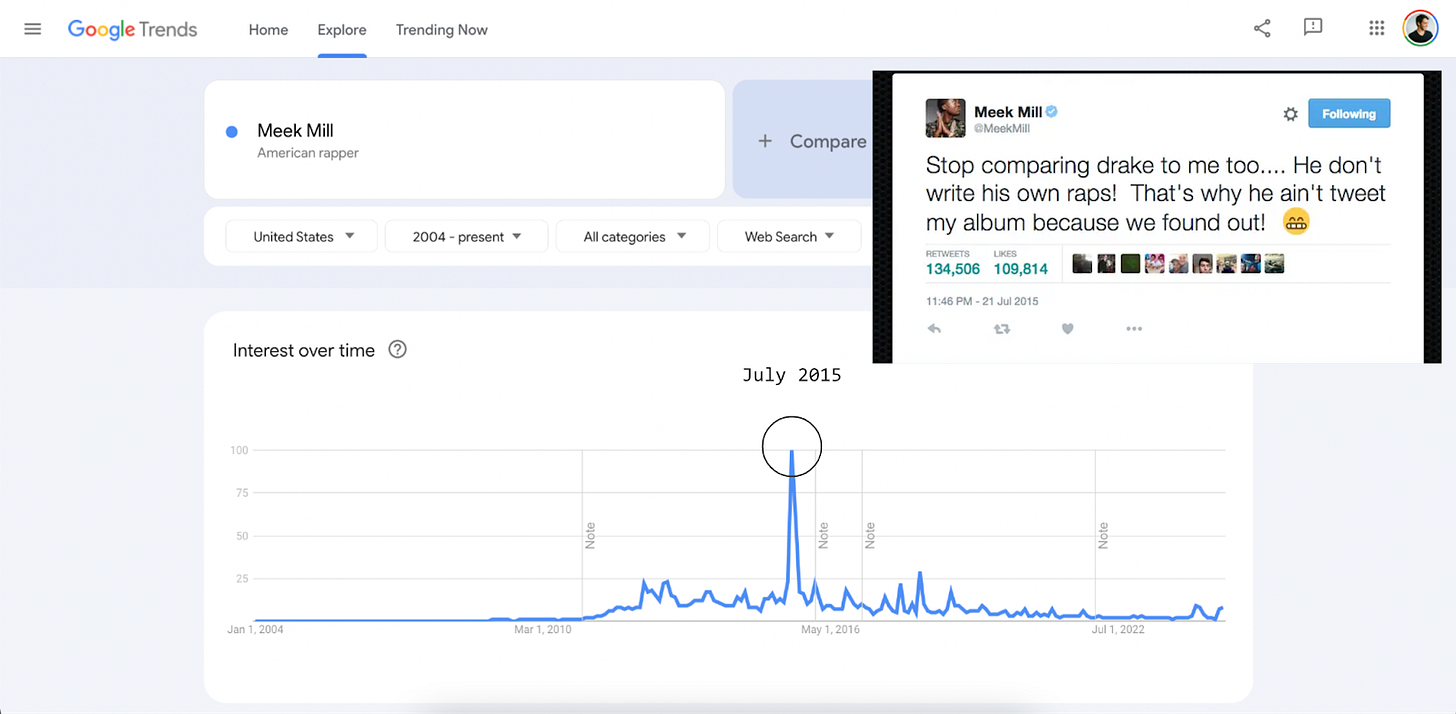
















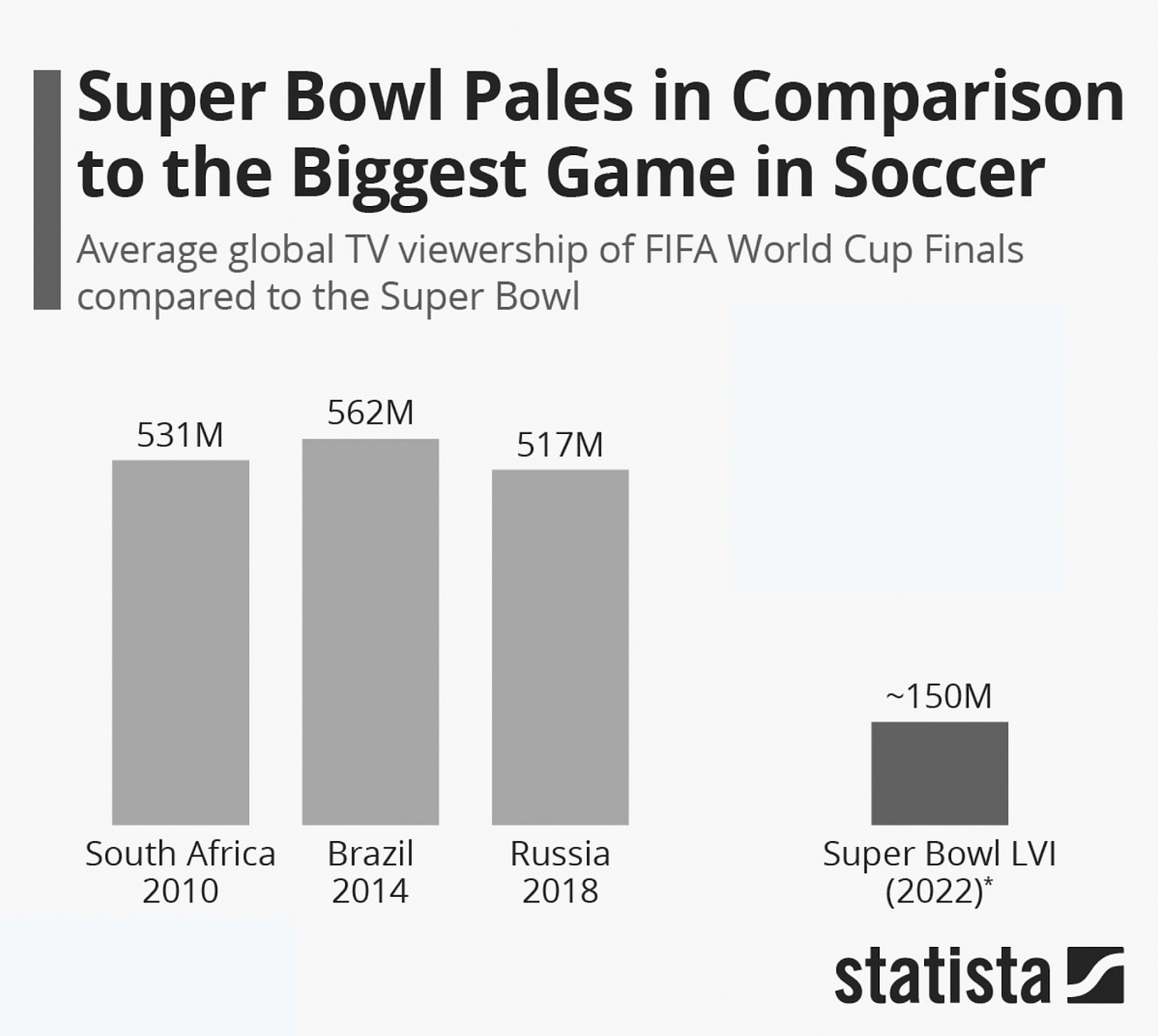





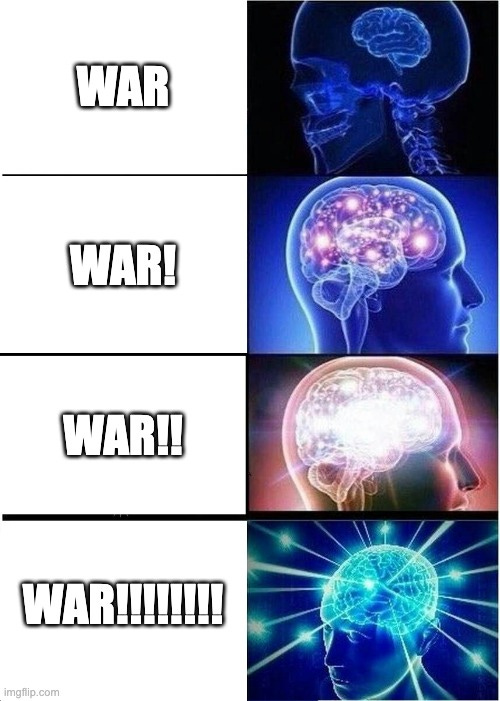



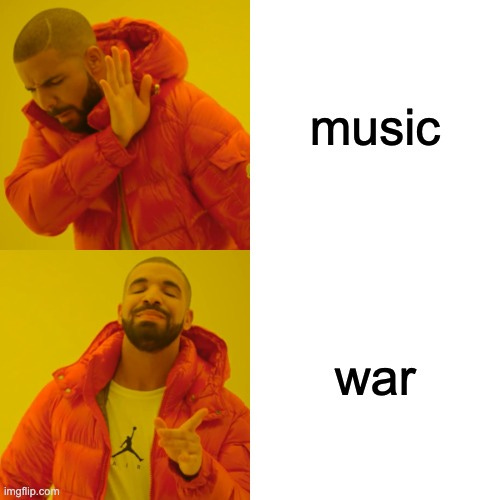
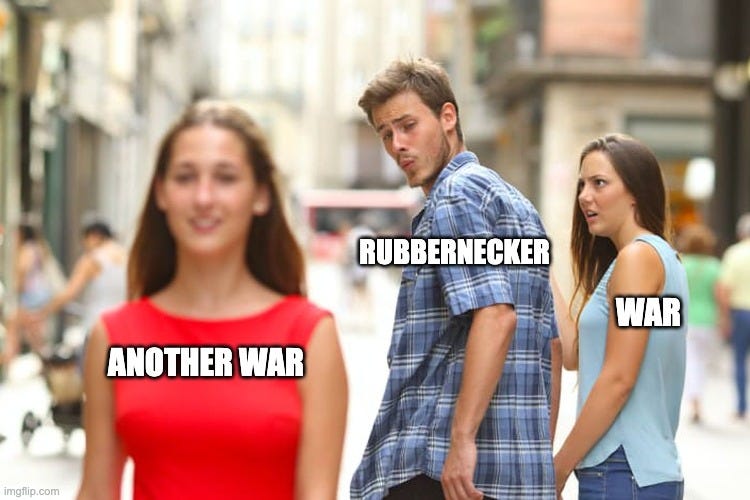




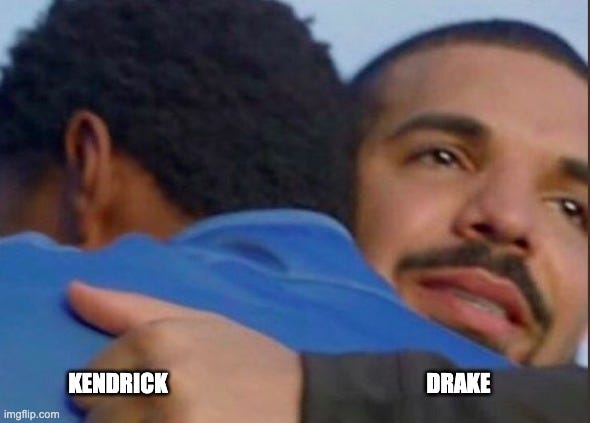
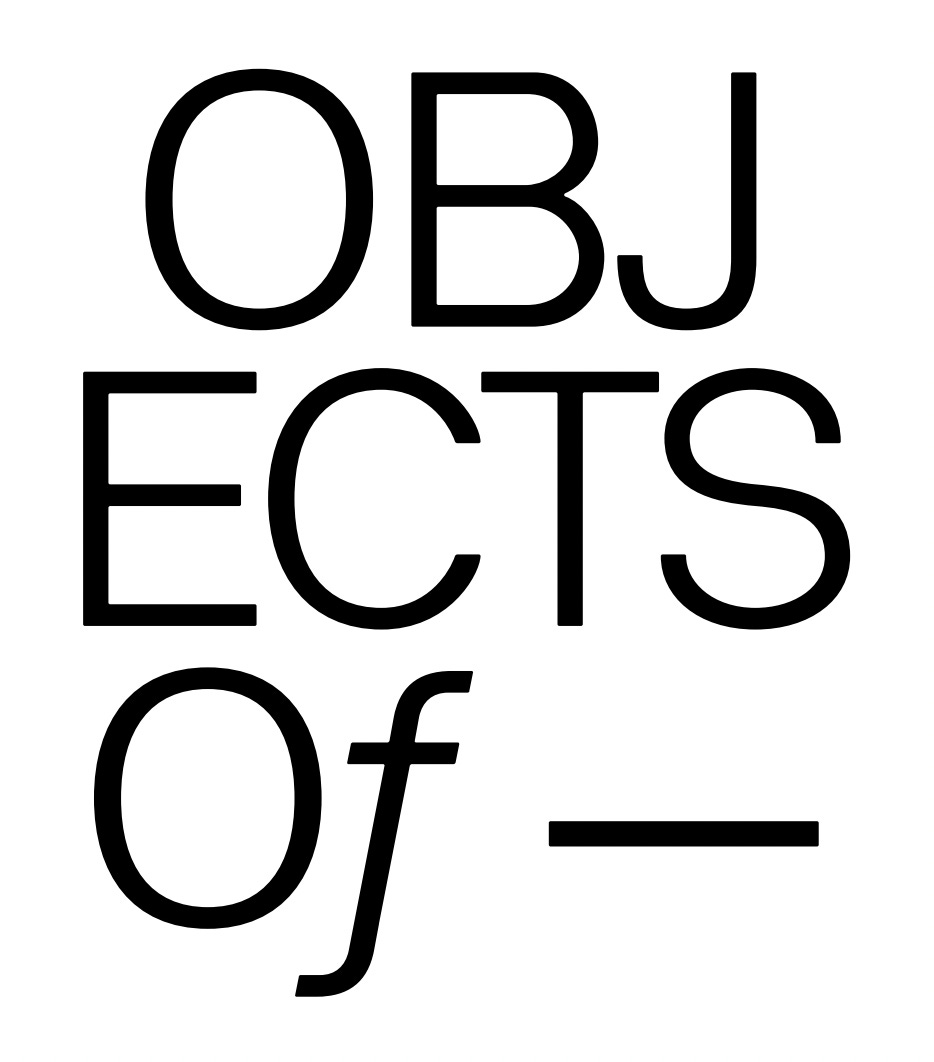
This was an excellent piece that I have thought about many times since it was written.